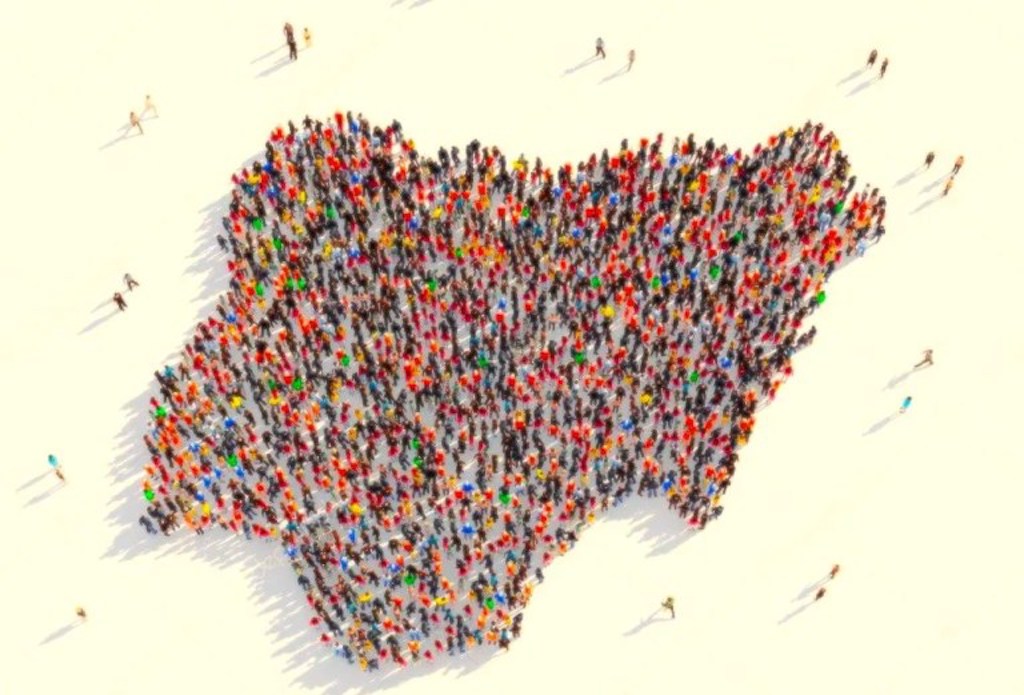
The population growth rate is a problem because Nigeria has been characterised as the poverty capital of the world, with 93.9 million people currently living below the poverty line, according to an economist, Mr Bismarck Rewane. Also, seven million Nigerians are said to have fallen into extreme poverty in 2020 alone. Nigeria…with its 200 million plus population, was first declared world’s poverty capital in 2018…knocking India off the position.
Yesterday, I gave the Ninth Annual Population Lecture Series of the National Population Commission on the theme of ‘population, rights and peace.’ I agreed with Bode Augusto that the popular saying that, “Nigeria’s population is a strength” that could provide a demographic dividend, is false. As he argued:
“Population is only a strength if it is well educated, healthy, the economy has the capacity to provide them with employment, and households have enough income to buy goods and services produced by businesses.”
He added correctly, that one of Nigeria’s biggest problem is uncontrolled population growth: “Every year, we add five million people to our population. This is roughly the size of Liberia or Montenegro. In 1960, the population of the UK was 52 million, while that of Nigeria was 46 million; by 2015, the UK was 62 million, while Nigeria was 185 million and by 2070, Nigeria will be 550 million, while the UK will be only 80 million! This means that over a period of 110 years, Nigeria will add over 500 million to her population, whilst the UK would add only 30 million and the UK was coming from a higher base. This is frightening!”
The population growth rate is a problem because Nigeria has been characterised as the poverty capital of the world, with 93.9 million people currently living below the poverty line, according to an economist, Mr Bismarck Rewane. Also, seven million Nigerians are said to have fallen into extreme poverty in 2020 alone. Nigeria, Rewane says, with its 200 million plus population, was first declared world’s poverty capital in 2018, in a report by the Brookings Institution, knocking off India from the position. According to the report, the number of Nigerians in extreme poverty increases by six people every minute.
No regime in Nigeria’s history has borrowed as extensively as the Buhari administration. According to Dr Doyin Salami, the Chair of the Economic Advisory Council to the President, Nigeria’s current debt stock is unsustainable, with a service to revenue ratio of 98 per cent, which is increasing, even if the debt to GDP ratio is a relatively low 35 per cent. We have been borrowing massively to pay for recurrent budget expenditure, while revenues have been reducing, rather than growing. The main concern is the high rate of increase of the debt stock. We are leaving a toxic legacy for young Nigerians who would be left with the debt burden. No generation of leaders should be so wicked.
For too long, the rate of economic growth in the country has been lower than the rate of population growth, which means that the average Nigerian has been getting poorer every year. This unfolding scenario is one of demographic explosion, due to the ticking time bomb of the growing population. Part of the solution is to reduce the population growth rate.
Poverty in Nigeria is not evenly spread. The number of people living in poverty in the Northern region has been increasing since 2011, and in 2016 it represented 87 per cent of all poor people in Nigeria. In contrast, the South is achieving greater progress, with only about 12 per cent of its population living in poverty in 2016. In general, inequality has increased in recent years, as indicated by the Gini coefficient increase from 0.36 to 0.42 between 2011 and 2016, a situation that fuels instability and conflicts.
The most important contemporary problem for Nigeria is the lack of opportunity for the youth. The country has developed a huge youth bulge that has been growing rapidly. This is happening at a time in which formal opportunities for employment are declining and having a job has become a minority experience. The North is the most affected region in the country in this regard. The North, especially the North-East and North-West, are the most backward regions of Nigeria in all social sectors. It has the highest birth rate in the contemporary world, the lowest level of economic development, the least access to education and the poorest network of health facilities and staff. The population of the North is growing at a higher rate than the rest of the country, thereby deepening poverty rates.
In Nigeria, in 2015, the fertility rate was 5.5 births per woman, but this increased in 2016 to 5.8 births per woman. This means that women in Nigeria will have, on the average, 5.8 children each during their entire childbearing years. The North has higher fertility rates than the rest of the country, with Jigawa State recording the highest fertility rate of 8.5 children per woman and Kano, 7.7, according to the 2016 survey conducted by the National Bureau of Statistics. The problem generated by this very large family sizes has manifested itself in the persistent trend of sending boys off into almajiranci and girls into child marriage in the North-East and North-West. The practice is often justified on religious grounds. The pressure of feeding large families with lots of children is significant and might very well play a push factor role in getting these children out of the family responsibility in their early teens. If it is not a poverty issue, why do most elite families from the same zone not send their children into almajiranci and early marriage?
For too long, the rate of economic growth in the country has been lower than the rate of population growth, which means that the average Nigerian has been getting poorer every year. This unfolding scenario is one of demographic explosion, due to the ticking time bomb of the growing population. Part of the solution is to reduce the population growth rate. China’s one-child policy has been the most drastic and most successful attempt to reduce the population growth rate and accelerate economic development in recent times. I doubt if any other country in the world can successfully implement such a drastic policy.
Nigeria’s most feasible policy option is to begin to engage in public education about the advantages of smaller families, in which the resources to educate and maintain the children are more available. Nonetheless, cultural resistance to such a policy might be very high. By simply keeping girls in school until they are at least 18 years old, there would be a significant reduction in the fertility rate. As Famoroti has argued, “Education is the least invasive contraceptive”. He also points out that historically, female empowerment has been even more essential in bringing down birth rates. Empowering women in and outside the home – in the workplace, politics, religious institutions etc will lead them to make different decisions regarding the bearing and raising of children.
There are too many groups that have discovered that obtaining an AK47 can be their pathways to wealth because they are not in government, where you can be wealthy by stealing without arms. This is the demographic time bomb in which we find ourselves today.
According to Henrik Urdel, a review of population dynamics worldwide, between years 1950 and 2000, showed that high fertility rates produce a youth bulge, which, in turn, is a precursor to domestic armed conflict. It is therefore not surprising that the state of insecurity in Nigeria has reached an unprecedented level. On a daily basis, well-coordinated commando-like operations by gunmen are organised against rural communities, where people are kidnapped for ransom, their houses burnt and their property looted. Similar attacks are also conducted against the army and police. These attacks are now occurring in virtually all geopolitical zones in the country.
As Governor Bello Matawalle of Zamfara put it, there are no fewer than 30,000 gunmen spread across more than 100 camps in and around the State. He said such is the grip of bandits on the State that they collected N970 million as ransom from the families of their victims in the eight years between 2011 and 2019. During the same period, the bandits killed 2,619 people and kidnapped 1,190 others. For some years now, significant proportion of farmers cannot go to their farms out of fear, as such food insecurity is on the horizon.
General Abdulsalam Abubakar, Chairman of the National Peace Committee, told Nigeria in April this year that there are six million weapons circulating in the hands of non-state actors in Nigeria and they are using them. The death toll, he estimates, is 80,000, while about three million people are internally displaced. The country finds itself at a point in our national trajectory where young Nigerians feel sufficiently marginalised from the STATE and SOCIETY to procure arms and engage in self-help, which they define variously as banditry, scorched earth attacks on innocent village communities, accompanied by mass rape and other forms of sexual violence, in addition to the killing of security agents, and even the declaration of an Islamic Caliphate in Nigeria.
There are too many groups that have discovered that obtaining an AK47 can be their pathways to wealth because they are not in government, where you can be wealthy by stealing without arms. This is the demographic time bomb in which we find ourselves today.
A professor of Political Science and development consultant/expert, Jibrin Ibrahim is a Senior Fellow of the Centre for Democracy and Development, and Chair of the Editorial Board of PREMIUM TIMES.
Support PREMIUM TIMES' journalism of integrity and credibility
Good journalism costs a lot of money. Yet only good journalism can ensure the possibility of a good society, an accountable democracy, and a transparent government.
For continued free access to the best investigative journalism in the country we ask you to consider making a modest support to this noble endeavour.
By contributing to PREMIUM TIMES, you are helping to sustain a journalism of relevance and ensuring it remains free and available to all.
TEXT AD: Call Willie - +2348098788999









